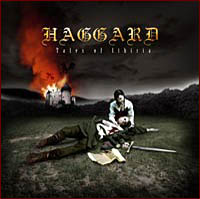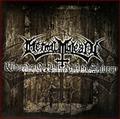HAGGARD (de) - Tales Of Ithiria (2008)

Label : Drakkar Entertainment / Season of Mist
Sortie du Scud : 29 août 2008
Pays : Allemagne
Genre : Metal Médiéval et Symphonique
Type : Album
Playtime : 11 Titres - 43 Mins
Depuis son arrivée officielle sur le devant de la scène (qui remonte à 1991), HAGGARD cultive la différence à tout point de vue. Tout d’abord, l’appellation « groupe » me semble erronée pour nos allemands. Dans le cas ici présent, on parle plutôt d’orchestre. Seize membres, plus un non-permanent, voilà de quoi est composé ce beau bébé de dix-sept ans. Pour l’anecdote, ils n’étaient pas moins de vingt-et-un avant leur second disque, Awaking The Centuries. Niveau instruments, la diversité est de mise. Quatre chanteurs (dont deux sopranos), trois guitares, une basse, une batterie. Jusque là, pas de quoi fouetter une Chantilly. Avant l’apparition d’un clavecin, de deux violons, d’une harpe, de flûtes, de hautbois, de clarinettes et même d’un crumhorn (sorte de cor médiéval recourbé). N’imaginez pas pour autant un hybride d’ELUVEITIE, CORVUS CORAX et IN EXTREMO, gardez-vous même d’y penser. Le côté novateur est avant tout à chercher dans l’art de manier et d’harmoniser telle diversité. Car à l’écoute de ce Tales Of Ithiria, d’aucun n’est inutile, chacun à une place, une présence et un rôle à jouer.<be>
C’est ainsi que nous sommes immergés dans le monde féérique d’Ithiria. Son créateur (Asis Nasseri, chanteur/guitariste) ne cache d’ailleurs pas sa passion pour l’Histoire et quelques uns de ses principaux protagonistes comme Nostradamus ou Galilée. Les références sont honorables car nous sortons du contexte vie/mort, ange/démon et bien/mal pour aborder des thèmes un peu plus spirituels et innovants ; le cosmos, les astres et l’Histoire. Un plongeon au cœur du passé. N’allez pas croire que les sonorités sont aussi moyenâgeuses que l’effet d’ambiance. HAGGARD s’en sort ici avec les honneurs grâce à son quatuor vocal, d’une complémentarité stupéfiante avec des grunts ronchons et de pures envolées lyriques. Nous avons également droit à un narrateur quasi-toutes les deux pistes, qui vient éclaircir certains points essentiels dans la compréhension du concept imaginaire qu’est la quête d’Ithiria. Mais je vous laisse volontiers la primeur de l’épilogue. Les bavarois maîtrisent une fois de plus le trilinguisme avec les des tracks en anglais, allemand et espagnol. Une variété à souligner avec l’enivrante « Hijo De La Luna ». Si vous êtes amateur d’un Metal un peu plus pêchu, ne partez pas de suite car je vous affirme que certaines pistes sont aussi faites pour vous. L’épique éponyme où encore « The Sleeping Child » font partie des meubles qui composent les contes de cette contrée magique. HAGGARD à même pensé aux fans de Grindcore porcin, mais à moindre (voire minime) mesure avec pour changer, une petite teinte d’hémoglobine sur la pochette. Effectivement, ce détail semble capilotracté mais convenait parfaitement à l’introduction d’une note d’humour afin de souligner la qualité graphique dont à fait preuve le type du bookleg. Au rayon des fausses notes, nous retrouvons une certaine nervosité à être interrompu toutes les cinq minutes par le narrateur susnommé. Egalement, et cela s’applique surtout à ceux qui préfèrent quand ça vous déstructure les neurones, une lassitude aux atmosphères « cour du roi » pour la plupart théâtralisées. Rien de bien sabotant.
Ô, marauds, vous qui conchiez le Metal, allez quérir sans vergogne un acquiescement pour Ithiria et piétonnons prestement à la brune en direction du castel. Vous en reviendrez aux vêpres tout giguedouillant, croyez-en mon ouïe.
Ajouté : Vendredi 15 Août 2008
Chroniqueur : Stef.
Score :    
Lien en relation: Haggard Website
Hits: 11147
|














